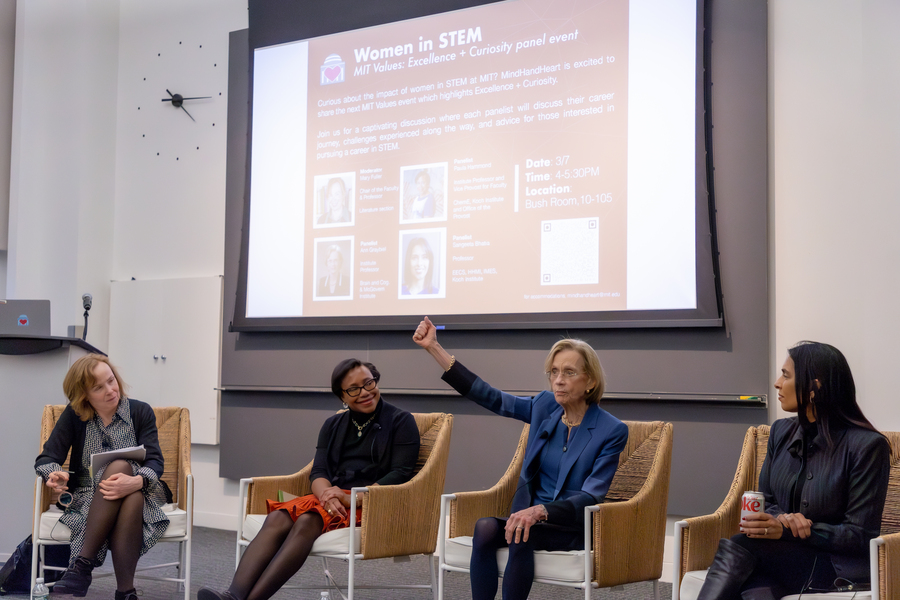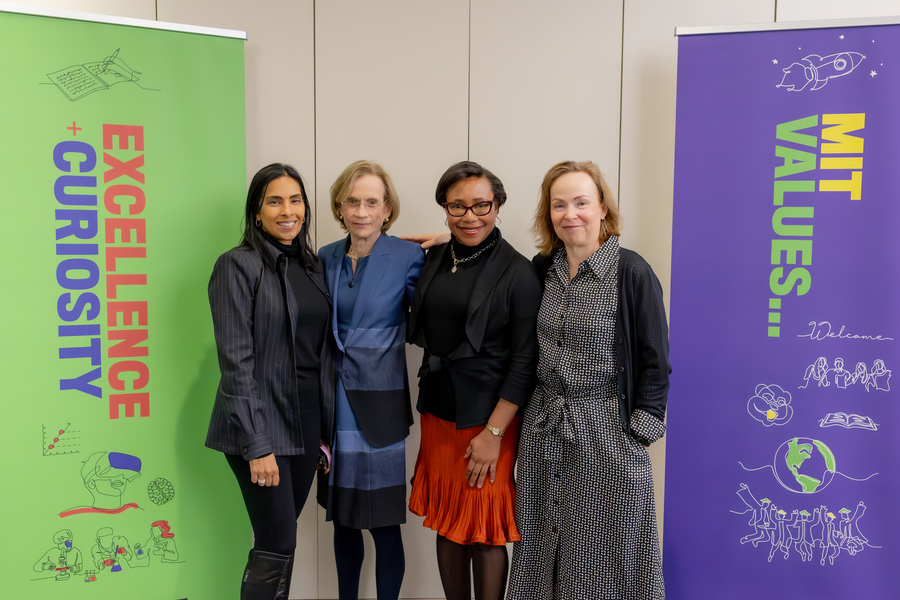Women in STEM — A celebration of excellence and curiosity
 (From left to right): MIT professors Mary Fuller, Paula Hammond, Ann Graybiel, and Sangeeta Bhatia. Photo: Safia Benyettou.
(From left to right): MIT professors Mary Fuller, Paula Hammond, Ann Graybiel, and Sangeeta Bhatia. Photo: Safia Benyettou. What better way to commemorate Women’s History Month and International Women’s Day than to give three of the world’s most accomplished scientists an opportunity to talk about their careers? On March 7, MindHandHeart invited professors Paula Hammond, Ann Graybiel, and Sangeeta Bhatia to share their career journeys, from the progress they have witnessed to the challenges they have faced as women in STEM. Their conversation was moderated by Mary Fuller, chair of the faculty and professor of literature.
Hammond, an Institute professor with appointments in the Department of Chemical Engineering and the Koch Institute for Integrative Cancer Research, reflected on the strides made by women faculty at MIT, while acknowledging ongoing challenges. “I think that we have advanced a great deal in the last few decades in terms of the numbers of women who are present, although we still have a long way to go,” Hammond noted in her opening. “We’ve seen a remarkable increase over the past couple of decades in our undergraduate population here at MIT, and now we’re beginning to see it in the graduate population, which is really exciting.” Hammond was recently appointed to the role of vice provost for faculty.
Ann Graybiel, also an Institute professor, who has appointments in the Department of Brain and Cognitive Sciences and the McGovern Institute for Brain Research, described growing up in the Deep South. “Girls can’t do science,” she remembers being told in school, and they “can’t do research.” Yet her father, a physician scientist, often took her with him to work and had her assist from a young age, eventually encouraging her directly to pursue a career in science. Graybiel, who first came to MIT in 1973, noted that she continued to face barriers and rejection throughout her career long after leaving the South, but that individual gestures of inspiration, generosity, or simple statements of “You can do it” from her peers helped her power through and continue in her scientific pursuits.
Sangeeta Bhatia, the John and Dorothy Wilson Professor of Health Sciences and Technology and Electrical Engineering and Computer Science, director of the Marble Center for Cancer Nanomedicine at the Koch Institute for Integrative Cancer Research, and a member of the Institute for Medical Engineering and Science, is also the mother of two teenage girls. She shared her perspective on balancing career and family life: “I wanted to pick up my kids from school and I wanted to know their friends. … I had a vision for the life that I wanted.” Setting boundaries at work, she noted, empowered her to achieve both personal and professional goals. Bhatia also described her collaboration with President Emerita Susan Hockfield and MIT Amgen Professor of Biology Emerita Nancy Hopkins to spearhead the Future Founders Initiative, which aims to boost the representation of female faculty members pursuing biotechnology ventures.

A video of the full panel discussion is available on the MindHandHeart YouTube channel.
Media Inquiries
Journalists seeking information about EECS, or interviews with EECS faculty members, should email eecs-communications@mit.edu.
Please note: The EECS Communications Office only handles media inquiries related to MIT’s Department of Electrical Engineering & Computer Science. Please visit other school, department, laboratory, or center websites to locate their dedicated media-relations teams.